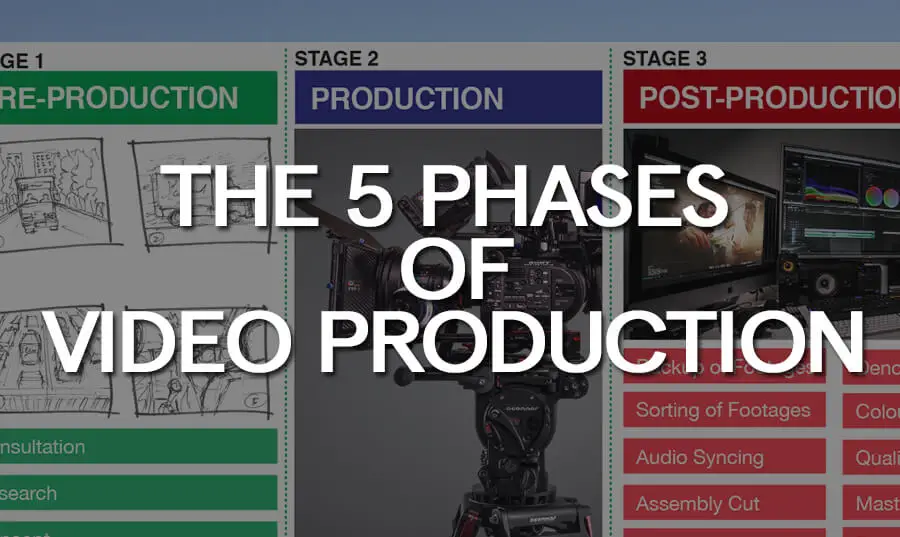A lot of work goes into producing quality video content, but just how much work are we talking about?
Understanding the importance of video content is not enough; you must also understand how the production stages work, what to do during production, and how to ensure that your final product is of the finest quality.
The planning and preparation stages of video production tend to take the most brainpower and will determine how the rest of video production will go, but the actual production stage might take the most time.
What is Video production?
Video production goes beyond sitting behind the camera and hitting record. Video production requires three main phases before reaching completion: pre-production, production, and post-production.
Here are the five overall stages of video production, and how to go about them for final success.
1. Development Stage
During the strategy/development stage, you must determine what type of video you want to make; think commercials, explainer videos, social media videos, infomercials, and more. The type of video you want to make will determine how you go about strategizing.
The development stage is also where you will decide on who your target audience is, and how your core audience impacts your video production. Brainstorm with your team, and let the creative juices flow.
2. Pre-Production Stage
The pre-production stage is the first step in the entire process, and this is where a lot of the brainwork happens. This stage is all about preparation, planning, research, and organization.
You must conduct proper research on everything including your video strategy, budget, storyline, script creation, talent, production team, and location. Every single thing that needs to be done during this stage must be completed.
Depending on the size of your project, here are some of the tasks you should complete during this stage;
Fact-finding
Connect with your video production team and the people who call the shots in your company. During the meeting, discuss everything from the purpose of your video, to the strategies you will use to achieve that purpose, your target audience, branding, and the general tone that you want your video to take.
Site visit
If you’re doing a particularly large or complex video shoot, it might be necessary to scout a location first. A visit to the location before the shoot will help you, the videographer, and the photographer get a better feel of what the final video will look like.
Preparation
Preparation covers everything from reviewing the scripts, double-checking interview questions and characters, confirming everyone’s schedules, and ensuring that everything goes according to plan.
3. Production
Your video production stage is the most time-consuming phase and one where all your previous planning will be put to test. If you have done everything right in your pre-production stage, this phase should be easier.
However, there is always a margin for error, so don’t be surprised if all the planning in the world doesn’t stop little delays and mistakes from happening. For example, natural issues like the weather could delay or postpone your shoot, but there should always be a backup plan.
The production stage works like a well-oiled machine when the shooting schedule has been fully planned during pre-production. Everything ought to work like clockwork during every shoot; even members of the crew should know where to stand at all times, how to take down their equipment in the shortest possible time, and how to remount them at the next shoot. If things like an equipment malfunction happen, there should be someone on hand whose job it is to handle the problem.
Your crew can shoot multiple takes as needed, but don’t worry about sounds and additional effects. These will be added at a later stage.
The entire duration of your production stage largely depends on the complexity of your video production, and how carefully you have structured the pre-production stage. A short social media video might be shot in just a day with just a few takes, but more complicated videos like a TV commercial with multiple scenes might be shot over days to weeks.
4. Post-Production Stage
During your post-production stage, your video will finally take shape as you put all the shots together. Here is when you will clean your audio and video, and all mistakes will be deleted, edited, or corrected as the case may be. All shots will also be arranged into their final sequence.
Again, if your development and pre-production stage was carefully done, your post-production stage won’t take as much time and there would be fewer errors. Also, it is important that you work with the right staff and equipment during your production, because even the most skilled producers can’t do much to improve low-quality audio and video during post-production.
Your post-production stage is where all the cool elements like CGI and special effects are added. Your video sound also comes to life, and you can make edits or reshoots if the audio isn’t to your liking. Here, you also add texts and captions to your video.
5. Marketing and Distribution
After production, your video is finally ready for the public to consume, but it has to be marketed and distributed strategically.
Depending on your target audience, you can market and distribute your video content to social media and other online venues, traditional television, or video platforms. If your video is aimed at a younger audience, social media and online venues are your best bet to get their attention. For an older audience, you should stick with traditional television.
Although knowing your target audience saves you substantial costs in marketing, you can push your video content to all platforms for maximum effect.
Conclusion
Your video will be successful based on its content and quality. Quality videos will catch the viewer’s eye, and engaging content will hold their attention to ensure that they don’t forget what your video is saying.
All stages of video production are important to create a final product that is as quality and professional as possible.

